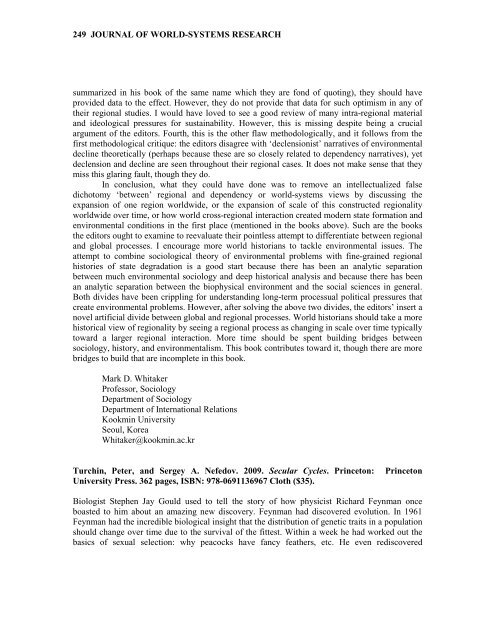Entire Volume 17 issue 1 - Journal of World-Systems Research ...
Entire Volume 17 issue 1 - Journal of World-Systems Research ...
Entire Volume 17 issue 1 - Journal of World-Systems Research ...
You also want an ePaper? Increase the reach of your titles
YUMPU automatically turns print PDFs into web optimized ePapers that Google loves.
249 JOURNAL OF WORLD-SYSTEMS RESEARCH<br />
summarized in his book <strong>of</strong> the same name which they are fond <strong>of</strong> quoting), they should have<br />
provided data to the effect. However, they do not provide that data for such optimism in any <strong>of</strong><br />
their regional studies. I would have loved to see a good review <strong>of</strong> many intra-regional material<br />
and ideological pressures for sustainability. However, this is missing despite being a crucial<br />
argument <strong>of</strong> the editors. Fourth, this is the other flaw methodologically, and it follows from the<br />
first methodological critique: the editors disagree with ‘declensionist’ narratives <strong>of</strong> environmental<br />
decline theoretically (perhaps because these are so closely related to dependency narratives), yet<br />
declension and decline are seen throughout their regional cases. It does not make sense that they<br />
miss this glaring fault, though they do.<br />
In conclusion, what they could have done was to remove an intellectualized false<br />
dichotomy ‘between’ regional and dependency or world-systems views by discussing the<br />
expansion <strong>of</strong> one region worldwide, or the expansion <strong>of</strong> scale <strong>of</strong> this constructed regionality<br />
worldwide over time, or how world cross-regional interaction created modern state formation and<br />
environmental conditions in the first place (mentioned in the books above). Such are the books<br />
the editors ought to examine to reevaluate their pointless attempt to differentiate between regional<br />
and global processes. I encourage more world historians to tackle environmental <strong>issue</strong>s. The<br />
attempt to combine sociological theory <strong>of</strong> environmental problems with fine-grained regional<br />
histories <strong>of</strong> state degradation is a good start because there has been an analytic separation<br />
between much environmental sociology and deep historical analysis and because there has been<br />
an analytic separation between the biophysical environment and the social sciences in general.<br />
Both divides have been crippling for understanding long-term processual political pressures that<br />
create environmental problems. However, after solving the above two divides, the editors’ insert a<br />
novel artificial divide between global and regional processes. <strong>World</strong> historians should take a more<br />
historical view <strong>of</strong> regionality by seeing a regional process as changing in scale over time typically<br />
toward a larger regional interaction. More time should be spent building bridges between<br />
sociology, history, and environmentalism. This book contributes toward it, though there are more<br />
bridges to build that are incomplete in this book.<br />
Mark D. Whitaker<br />
Pr<strong>of</strong>essor, Sociology<br />
Department <strong>of</strong> Sociology<br />
Department <strong>of</strong> International Relations<br />
Kookmin University<br />
Seoul, Korea<br />
Whitaker@kookmin.ac.kr<br />
Turchin, Peter, and Sergey A. Nefedov. 2009. Secular Cycles. Princeton: Princeton<br />
University Press. 362 pages, ISBN: 978-0691136967 Cloth ($35).<br />
Biologist Stephen Jay Gould used to tell the story <strong>of</strong> how physicist Richard Feynman once<br />
boasted to him about an amazing new discovery. Feynman had discovered evolution. In 1961<br />
Feynman had the incredible biological insight that the distribution <strong>of</strong> genetic traits in a population<br />
should change over time due to the survival <strong>of</strong> the fittest. Within a week he had worked out the<br />
basics <strong>of</strong> sexual selection: why peacocks have fancy feathers, etc. He even rediscovered





